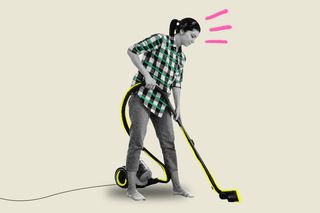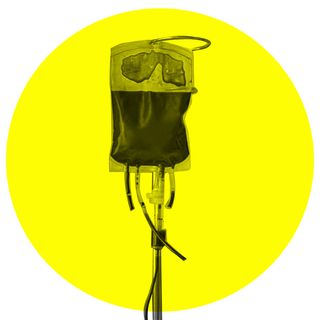
Why Some People Find Cleaning Therapeutic
The repetition and predictability of cleaning can give individuals a sense of control during stressful times.

Most of us have come across people who resort to cleaning obsessively when they’re feeling low or having a bad day. It can be a blessing to have them in our lives as friends, partners, or roommates to help us organize our closets and bookshelves — but it can also drive us up the wall when a perfectly clean room gets upended as they dust, sweep and swab yet again. Or get antsy when they decide to take a day off from their usual tidying routine. How can cleaning be so essential to their wellbeing?
A 2015 study found that “repetitive and predictable actions,” like those involved in cleaning, act as a coping strategy against temporary anxiety — similar to biting one’s nails, pacing up and down, or praying. Moreover, “if there is order to the house or environment, we may feel safe and like we can move in the space,” Martin Lang, an evolutionary anthropologist at Masaryk University, in the Czech Republic, who led the 2015 study, said at the time. He added that the act of establishing order alone can act as the “cognitive mechanism that can help people deal with anxiety.”
Cleaning can also relieve one of temporary anxiety by providing a sense of control. “[Cleaning] gives people a sense of mastery and control over their environment. Life is full of uncertainty, and many situations are out of our hands, but at least we can assert our will on our living space,” Darby Saxbe, an assistant professor of psychology at the University of Southern California, told Vice.
Related on The Swaddle:
Why Do Some People Hoard Things?
Trying to establish structure, familiarity, and predictability into one’s surroundings by, say, organizing one’s closet or bookshelf, can also help alleviate stress. “We know the end result, and we know how to get there. That’s a very comforting notion…. From a survival perspective, predictability allows us to plan and better protect ourselves from potential threats,” Maggie Vaughan, psychotherapist, told Huffington Post.
Some people also report that cleaning helps them take their attention away from stressors by blocking everything as they simply focus on the task at hand: cleaning.
Moreover, cleaning can act as a mini-workout and provide the same neurochemical benefits that come with exercising. Activities like running up and down flights of stairs, sweeping and vacuuming floors, and moving around the house scrubbing floors, can not only provide a physical outlet for energy but also release endorphins that induce a sense of well-being, making us feel better.
For some, the act of cleaning relieves personal or professional stress. But for others, unclean or cluttered surroundings are the source of stress, causing cortisol (the stress hormone) levels to spike. “In our minds, we view clutter as unfinished business, and this lack of completeness is unsettling and stressful to most people,” Sherrie Bourg Carter, PsyD, a psychologist, explained.
Related on The Swaddle:
Why Do People Feel Morbid Curiosity?
And for others still, the two combine to compound the stress of other anxieties. “If we’re already dealing with a lot in our mind and now we’re looking at a lot [of dust or clutter] in our home or office space, it can make us feel stuck, and bogged down. Yes, you’re taking control of something that you can, but you’re also making your environment more soothing,Alicia H. Clark, PsyD, a psychologist, added.
In addition to relieving stress, clean surroundings help one focus better on tasks at hand and perform them more efficiently, since one’s visual cortex isn’t being overwhelmed by irrelevant objects. Further, living in cluttered spaces can also lead people to feel more depressed and fatigued. According to a 2010 survey by the National Sleep Foundation in the U.S., people who make their beds every day are also more likely to report regularly getting a good night’s sleep.
“I don’t clean because it is important to me, I clean because it reduces my anxiety…. No matter how often I clean there is always something else to do. It is a constantly cycling chore and I love it. Cleaning is a therapy that is always available for my anxiety,” Sigourney Humus, wrote about the link between cleaning and mental health.
Devrupa Rakshit is an Associate Editor at The Swaddle. She is a lawyer by education, a poet by accident, a painter by shaukh, and autistic by birth. You can find her on Instagram @devruparakshit.
Related


Treating Covid19 With Plasma Therapy Unhelpful in Most Cases: ICMR
